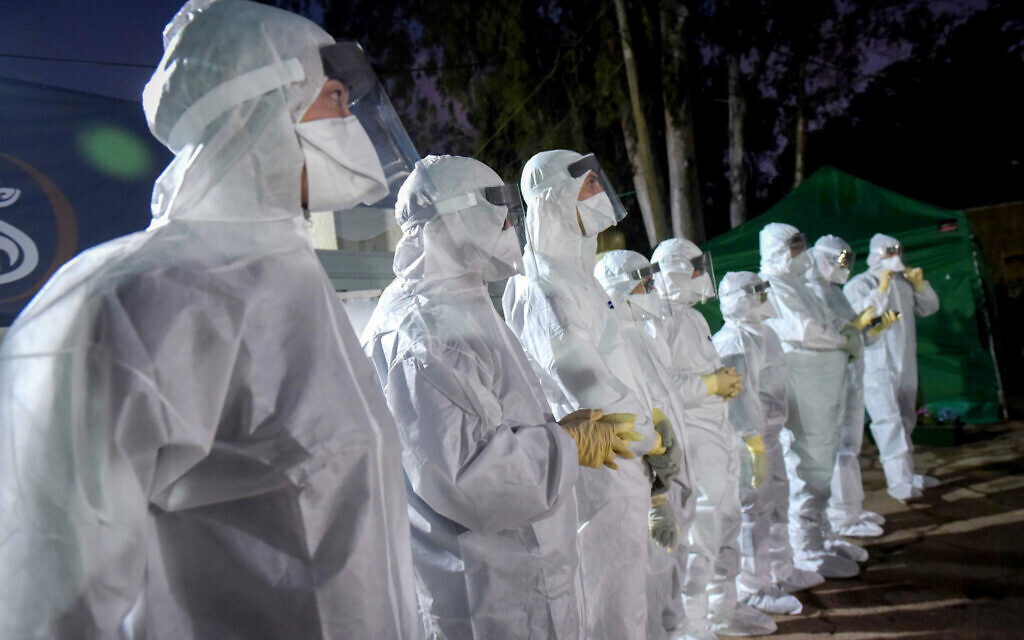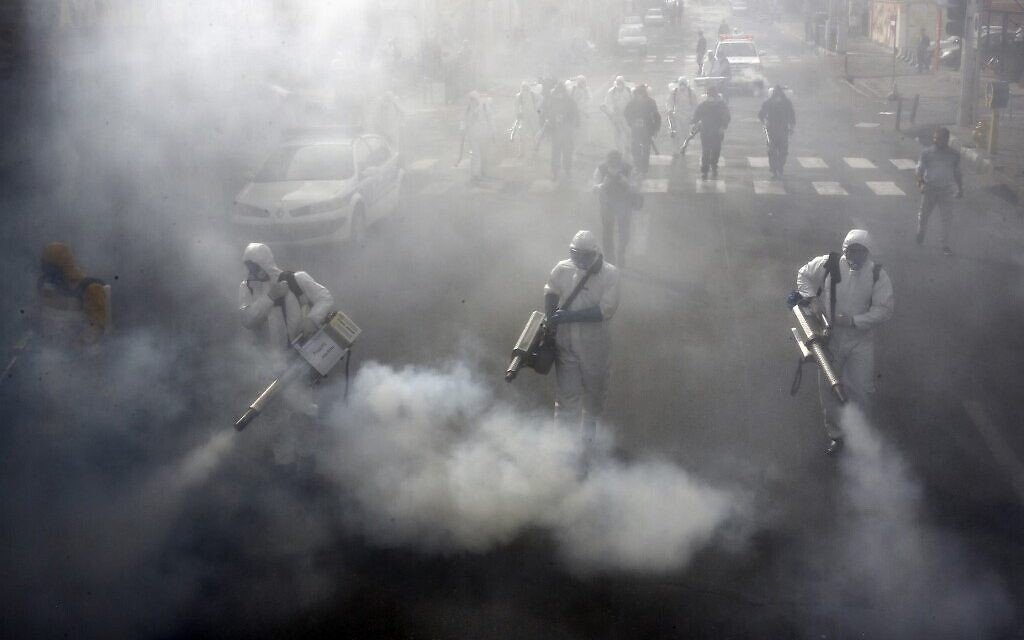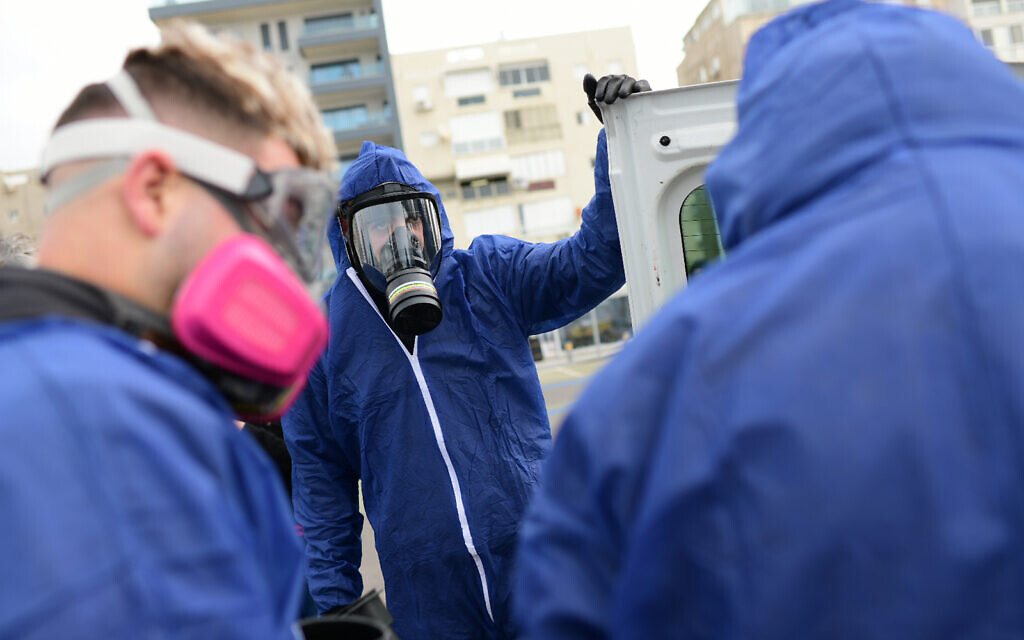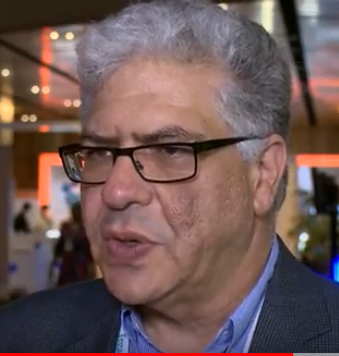Professor Yehuda Carmeli is head of the Department of Epidemiology at the Tel Aviv Sourasky Medical Center and a professor at the Sackler School of Medicine at Tel Aviv University. He is one of the medical professionals leading the Israeli Health Ministry’s response to the COVID-19 global pandemic.
The Times of Israel spoke to him at 7:30 Thursday morning, the only slot available in his busy day. We asked him a host of key questions to try to understand more about the coronavirus. Among them: How is it transmitted, is it or is not airborne, and why it is so contagious? How many people worldwide will ultimately be infected, with what consequent rate of fatalities? Why are the elderly at greater risk, and why are other age groups so much less so? Why are Israel and other countries responding in the ways that they are, and whose approaches are more and less effective? And what should the public expect in terms of the virus’ impact — not only on our health, but the disruption to our lives — and for how long?
1. Why were there “only” 3,000 coronavirus deaths in China, while in Italy, a much smaller country, we are seeing hundreds of people dying a day?
Actually not all of China was affected. In most of China there was a relatively small number of cases. There is a specific county, Hubei, that was affected and within it, the city of Wuhan. Wuhan has a population of 11 million. Also, in Italy, it was mostly the region of Lombardy, which has a population of [10 million]. So approximately the same size of population has been affected in both cases.
2. How many people will become infected worldwide if this pandemic is not checked?
There are various mathematical models that try to estimate the number of cases expected in different places. There is a saying about mathematical models that all of them are wrong but some are useful. We truly don’t know which of them is correct.
All models I have seen predict that by the end of this outbreak, which could be in several months or could be in a year or two, about 60-70 percent of the population will be infected at some point. Not all people who are infected become sick. Some don’t even notice that they have it, or have very minor symptoms.
But in the end you can take the world’s population and calculate 60 or 70 percent, and those are the numbers that will be affected by this pandemic.
3. Do we know what percentage of those will die?
We don’t know. I would say it varies by age. We know that below the age of 50 or even 60, death is extremely rare. Then in the older population, 60’s and above, for each decade there is a significant increase in the risk of death.
We don’t know the precise numbers. In a way, we had a laboratory which was the Diamond Princess cruise ship.

The Diamond Princess had 3,700 people on board, both staff and guests. There were six deaths. We don’t know how many people on board were infected. We do know how many were diagnosed.
So if we look at those numbers: Let’s assume everyone on board was infected –although we don’t know if that’s the case — six out of 3,700 is about 0.16 percent of the population. Many of the guests were over 50, two-thirds. So if we are optimistic, the death rate is 0.1 percent to 0.5 percent of the population.
4. What is your best estimate as an epidemiologist?
I like to be optimistic.
5. When you hear figures like a 3 percent death rate, that’s just 3 percent of people who’ve taken a test and were confirmed to be infected, but the people who are being tested are not a random group, are they? Aren’t they more likely to get tested if they have symptoms?
Exactly, and probably the three percent [figure among those confirmed to have the virus] is too low… When you calculate the number of deaths, you are looking at patients some of whom did not yet have a chance to die; from the time of infection, fatalities take about two to three weeks.
If you look at the number of what we call closed cases, meaning cases of patients who either recovered or died, the numbers go to six to nine percent dead. But again, we don’t know six percent of what.
6. It’s six percent of people who tested positive?
Yes.
7. But it’s not a random group of people who took the test?
There’s another factor. You have two or maybe three extreme situations. There’s China at the beginning of the outbreak, during the first two months before they got control of it. Then Italy, and I think also Iran.
Those three places had a huge number of cases in a very short amount of time. When you have so many cases, it exceeds the capacity of the health care system to take care of them. And then you get very high mortality rates.
In other countries, the death rate among diagnosed people is much lower.
So I think our main goal in dealing with this outbreak is slowing it down so there will not be more severe cases than the medical system can handle.

8. Why is Israel taking such strict measures, closing borders, canceling non-essential activities and telling people to stay home? [As of this writing, there have been no deaths from the virus in Israel; six people, all of them aged 60 and over, are seriously ill.] Is what you’re saying that we’re not facing apocalypse, and it’s not that there will be mass deaths, but we’re doing this because we don’t want to overwhelm the hospitals?
Well, I think it’s important to say that the risk for a particular person who’s infected is not relatively high, especially if that person is under 60.
9. What if someone is under 60 but has asthma, for example?
Once you reach the age of 60, your risk increases dramatically.
One of the things people say is that the people who died had comorbidities, they had other diseases. But who gets to the age of 60 without having other diseases? Very few people.
Some people have hypertension, some have diabetes, some have asthma or some lung problem. At the age of 60, and definitely by the age of 70, everyone has some type of illness.
Those may be very mild illnesses that do not affect your way of life or survival in the long run. But still they put you at high risk when it comes to coronavirus.
10. So if someone has, say, asthma but it doesn’t usually interfere with their life, how scared should they be?
Well, it doesn’t help to be scared. I think in general the older you are and the more illnesses you have, you need to be more careful.
And we tell people, if you’re elderly please try not to see too many people; try to reduce your chances to be exposed. What does that mean? It means that if you’re 60 and working and relatively healthy, your risk is lower. So you can allow yourself a little bit more than someone who’s 80, even if he’s healthy but has a few diseases.
11. Can this disease be caught through the air?
I would say for all practical purposes, no. The answer is not actually yes or no. Under regular conditions, normal living conditions, it’s transmitted by droplets, which means that you get infected by droplets from someone who is one or two meters away from you.
Transmission by air is much more contagious and much more difficult to control. But I would say that for all practical purposes, in non-hospitalized patients, we can think about it as not being transmitted by air
And then you can also catch it to a lesser extent by touch or contamination of the environment. But that’s probably much, much less important.
Under very unusual conditions, for example, when a hospital patient is mechanically ventilated or having a specific procedure on the respiratory tract, you can have transmission by air.
Transmission by air is much more contagious and much more difficult to control. But I would say that for all practical purposes, in non-hospitalized patients, we can think about it as not being transmitted by air.
12. There was an article in the New England Journal of Medicine saying that the virus does in fact linger in the air for a while…?
I’m sorry to say it but this article is unhelpful. It tells us that the virus can survive on different surfaces for one day, usually, but sometimes two days or three days. But its quantity decreases dramatically after 24 hours in the environment.
And the meaning of that is that if you go into a hotel room, for example, and the previous person who was there was sick with the coronavirus, then he shed some virus into the environment. If you go there two hours after him and the room has not been cleaned, then your chances of acquiring the disease are much higher than if you come 24 hours later.
But we truly don’t know the relationship between the virus’ survival in the environment and the chances of acquisition. We know that there is some chance, but I assume it’s relatively small.
In terms of the article, it looks at an experimental condition where you create very small particles containing the virus. And then you look to see how long they survive. But that’s not the question. The main question is how often patients generate those very small particles and how many of them do they generate?
Under normal living conditions, it’s a rare event or I would say a very rare event [for infection to be transmitted in this manner]. It can happen, for instance, when someone does a procedure on a patient’s lungs, for example, mechanical ventilation.

13. Why are the elderly severely affected by COVID-19, but children don’t seem to be?
I don’t know. I don’t think that anyone knows. It’s quite unusual. There are other diseases where children are affected less severely than others. But here they’re almost not affected at all.
We usually measure transmissibility by the number of virus particles that are required to cause an infection. So I assume that the virus is at a higher concentration in those droplets. Or that it has a much easier way to attach to human cells and infect them
They get infected but they don’t develop symptoms and if they develop symptoms, it’s usually quite mild. I don’t know if it’s immunity or if it’s the number of receptors that allow the virus to enter a cell. I have no idea why, but it’s clearly age-related.
14. What if a child has an underlying condition?
There are chances to become sicker, but I can tell you, that’s still extremely rare.
15. What makes this disease so contagious?
With previous events such as SARS-CoV-1, it was a virus that was less adapted to humans. When it caused disease it was severe, but it was not very easily transmissible from one person to another. It was mostly transmitted in hospitals, where you actually generated those airborne conditions.
The current coronavirus is much more transmissible between people and I don’t know the main reason for that. We usually measure transmissibility by the number of virus particles that are required to cause an infection. So I assume that the virus is at a higher concentration in those droplets. Or that it has a much easier way to attach to human cells and infect them.
16. Is that the main difference between this novel coronavirus and the original SARS? Are there other differences?
That’s the main, most important difference, because [the original] SARS disappeared once you controlled transmission in the hospitals. The current coronavirus, because of its ease of transmission, is transmitted mostly in the community and then it requires much stricter measures, like staying at home and curfews, to stop it.
17. If the elderly and chronically ill are the main people affected, why not just isolate them and let everyone else carry on as usual?
Well, there is no way to stop the disease from continuing to spread. It’s not that at one point it will just disappear. It will reach those populations and will hurt them.
What you’re describing is actually what the British initially tried to do. And then when they created mathematical models and looked at the effect this would have, they saw that the effects would ultimately be catastrophic.
The models showed that allowing the disease to continue to spread rapidly while protecting the elderly is truly impossible. You have to have intervention. You cannot put the elderly on a lonely island without seeing anyone who’s ever infected.
From a purely medical epidemiological point of view, there should be a complete curfew on the entire country for maybe a month
And once there are many infected people at the same time in the community, the disease will reach the elderly population.
For example, if you go to a nursing home, the workers and visitors at the nursing home are young people. You cannot stop every young person or external person from entering a nursing home.
If you have infected people coming into a nursing home, there can be dramatic consequences. If that were to occur in many places all at once, it would be catastrophic.
So you have to combine trying to stop it in younger people and in the population as a whole, and specifically trying even more so in the elderly.
18. Do you think the measures that Israel is taking now are good? Are they an overreaction or an under-reaction? And how long will we be living like this?
In many ways this question goes beyond my expertise because from a purely medical epidemiological point of view, there should be a complete curfew on the entire country for maybe a month: Don’t allow anyone go in and out of their houses. And even within homes separate one person from another.
Well that’s impossible. So I think that what Israel is doing is a very good compromise.
We don’t know how long it will be necessary to keep restrictions in place. We know that in Wuhan, China, they used very strict measures, I would say stricter measures than Israel, but they started to do it at a stage when the spread of the disease was much further along, which made the measures less effective.

It took them about two months to actually almost stop the outbreak or bring it to a very low level. So, you know, let’s be hopeful.
But I don’t think anyone at this point is trying to stop the outbreak. I think that’s probably beyond our ability already. What we are trying to do is slow the progression of the pandemic so the health care system can handle the situation.
I assume the restrictions will continue for several months.
The entire health care system will be completely preoccupied with dealing with this challenge that none of us has seen before. It’s been 100 years since a similar event
19. What does the rest of your day look like [the interview was conducted at 7:30 a.m.]. And how worried are you about what could happen over the next few months?
My day is extremely, extremely busy. The past few weeks have been like a single day. But it’s not only me, it’s the entire health care system.
20. Do you deal with patients who have the disease?
No, I don’t deal with patients. I deal with strategy and infection control. I actually work for the Health Ministry. We talk to hospital staffs on a daily basis. We visit hospitals all over the country. And what I think will happen is that the entire health care system will be completely preoccupied with dealing with this challenge that none of us has seen before. It’s been 100 years since a similar event [the Spanish flu] happened.
The entire system is stretching to increase its capacity to deal with patients who have the coronavirus and also with protecting the health care workers, maintaining their ability to continue to care safely for the patients. Truly the entire system will be busy with that for the next few months.
21. What if someone needs to go to the emergency room for something else, should they just try not to go?
Urgent medical care will continue to happen. What we are trying to do is divide sections of the hospitals. We’ll have staff that deal with coronavirus and staff that deal with everything else. As time passes, much more of our effort and our beds will go to the coronavirus, and fewer and only emergency situations will be handled in the hospital.
22. Thank you for taking the time to speak to us. Is there anything you would like to add?
I think it’s important that citizens adhere to the restrictions. We are operating in a very difficult time where people are worried, people are afraid.
We have very smart, good people leading our health care system and our crisis response. Mistakes may happen but overall they are being responsible.
In general, I think that as a society, we will have to be united in order to successfully get through this difficult period.
